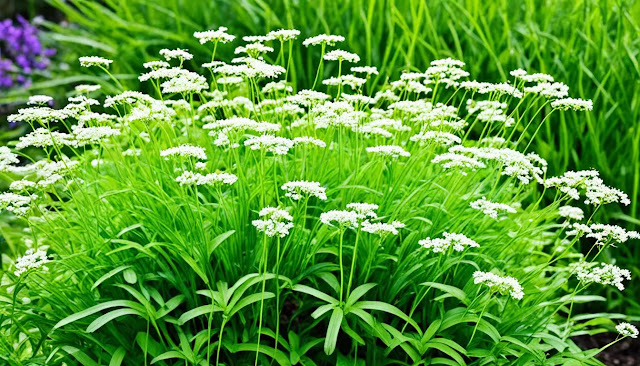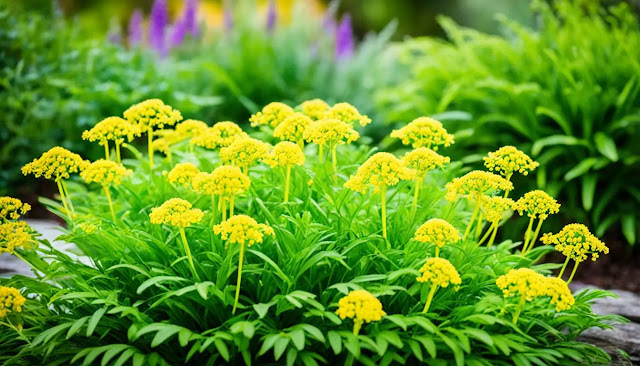 |
| do citronella plants effectively repel mosquitoes |
When it comes to mosquito control, citronella plants often take the spotlight as a natural solution. But do these green wonders truly possess the power to repel mosquitoes? Are they the answer to our buzzing insect woes? Let's uncover the truth and separate fact from fiction.
- Citronella plants are commonly believed to repel mosquitoes.
- The effectiveness of citronella plants as mosquito repellents has been a topic of debate.
- Scientific evidence and studies can shed light on the true capabilities of citronella plants.
- Understanding how to effectively use citronella plants and other mosquito-repellent methods is crucial in mosquito control.
- Alternative solutions and expert opinions can provide valuable insights for repelling mosquitoes.
What Makes Citronella a Popular Mosquito Repellent?
The Science Behind Citronella's Repellent Properties
Citronella, known for its distinct lemon-like aroma, has long been favored as a natural mosquito repellent. But what exactly makes citronella so effective at keeping these pesky insects at bay? The answer lies in the science behind its repellent properties.
Citronella contains a compound called citronellal, which is responsible for its characteristic scent. Mosquitoes have a strong sense of smell and are repelled by the odor of citronella. When exposed to citronella, mosquitoes tend to avoid the area due to its overpowering fragrance.
Furthermore, citronella has been found to disrupt the mosquitoes' ability to locate their prey by interfering with their receptors. This makes it harder for mosquitoes to detect the presence of humans, reducing their likelihood of biting and transmitting diseases.
Comparing Citronella to Other Common Mosquito Repellents
While citronella is widely recognized as a natural mosquito repellent, it is important to evaluate its effectiveness compared to other commonly used mosquito repellents. Let's take a closer look at how citronella stacks up against alternative options:
| Mosquito Repellent | Effectiveness | Natural or Chemical |
|---|---|---|
| Citronella | Effective | Natural |
| DEET | Highly Effective | Chemical |
| Picaridin | Highly Effective | Chemical |
| Lemon Eucalyptus Oil | Effective | Natural |
Note: The effectiveness of mosquito repellents can vary depending on factors such as concentration, application method, and individual susceptibility to mosquito bites.
Essential Oils and Their Effectiveness in Repelling Mosquitoes
Natural essential oils, including citronella, have gained popularity as alternatives to chemical mosquito repellents. These oils are derived from plants and contain compounds that repel mosquitoes. In addition to citronella, other essential oils known for their mosquito-repellent properties include:
- Lemon eucalyptus oil
- Lavender oil
- Peppermint oil
- Tea tree oil
While essential oils can be effective in repelling mosquitoes, it is important to note that their efficacy may vary. Some essential oils may provide short-term protection or need to be reapplied frequently. It is advisable to test a small patch of skin before applying essential oils to ensure there are no adverse reactions.
Overall, citronella's natural mosquito-repellent properties, along with its pleasant fragrance, make it a popular choice for individuals seeking a natural and effective way to ward off mosquitoes.
How to Effectively Use Citronella Plants to Keep Mosquitoes Away
 |
| citronella plant |
When it comes to mosquito control, citronella plants are a popular natural option. To maximize their repellent effect, proper placement is key. Here are some tips on how to effectively use citronella plants to keep mosquitoes away.
Ideal Placement of Citronella Plants for Maximum Repellent Effect
To ensure citronella plants are effective in repelling mosquitoes, it's important to place them strategically. Here are some guidelines for ideal placement:
- Position citronella plants near outdoor seating areas, such as patios, decks, or outdoor dining areas. This will create a mosquito-free zone for you and your guests to enjoy.
- Plant citronella in pots or containers that can be easily moved around. This allows you to relocate the plants to areas with high mosquito activity, such as near standing water sources or shady areas.
- Consider placing citronella plants near entry points of your home, such as doors or windows, to prevent mosquitoes from entering your living spaces.
- Ensure that the citronella plants receive at least 6 hours of direct sunlight each day. This will help to release their natural oils and enhance their mosquito-repellent properties.
Other Mosquito-Repellent Plants to Complement Citronella
While citronella plants are effective in repelling mosquitoes, they can be further enhanced when used in combination with other mosquito-repellent plants. Some plants that complement citronella include:
- Lemon balm
- Lavender
- Marigolds
- Rosemary
- Basil
These plants contain natural compounds that mosquitoes find unappealing, making them a valuable addition to your mosquito control strategy.
Understanding the Limitations of Citronella Plants in Mosquito Control
While citronella plants can be effective in repelling mosquitoes, it's important to understand their limitations. Here are some factors to consider:
- Citronella plants have a limited range of effectiveness. In a larger outdoor area, multiple plants or other mosquito control methods may be necessary.
- The effectiveness of citronella plants can be influenced by environmental factors, such as wind and rain. Strong winds can disperse the scent, reducing its repellent effect, while heavy rainfall can wash away the oils.
- Individual reactions to citronella scent may vary. While most people find the scent pleasant, some individuals may be sensitive or allergic to it.
- Citronella plants are most effective when their leaves are crushed or their oils are released. Simply having the plants in the vicinity may not provide sufficient protection against mosquitoes.
By understanding these limitations and incorporating other mosquito-repellent strategies, you can maximize the effectiveness of citronella plants in your mosquito control efforts.
Exploring the Best Ways to Keep Mosquitoes Out of Your Yard
 |
| mosquito repellent plants |
Mosquitoes can quickly turn your outdoor paradise into a buzzing nightmare. To make your yard a mosquito-free zone, it's essential to adopt effective strategies that target these pesky insects. In this section, we will explore the best methods to keep mosquitoes out of your yard, from incorporating mosquito repellent plants into your garden design to eliminating standing water and reducing mosquito habitats. We will also evaluate the effectiveness of natural and chemical repellents to help you determine which option works best for your needs.
Incorporating Mosquito Repellent Plants into Your Garden Design
One effective and aesthetically pleasing way to keep mosquitoes at bay is by incorporating mosquito repellent plants into your garden design. These plants naturally emit scents that repel mosquitoes, creating a protective barrier around your outdoor living space. Some popular mosquito repellent plants include:
- Citronella
- Lemon balm
- Lavender
- Marigolds
- Rosemary
By strategically placing these plants in your garden or in pots on your patio, you can help keep mosquitoes away while adding beauty to your outdoor environment.
Practical Tips for Eliminating Standing Water and Reducing Mosquito Habitats
Since mosquitoes breed in standing water, it's crucial to eliminate any potential breeding grounds in your yard. Here are some practical tips:
- Regularly empty and clean birdbaths, flowerpots, and saucers to prevent water accumulation.
- Clear clogged gutters and ensure proper drainage to prevent water pooling.
- Keep swimming pools clean and well-maintained or use appropriate treatments.
- Cover rain barrels and trash cans tightly to prevent water accumulation.
- Repair leaky outdoor faucets to prevent water dripping and pooling.
By diligently eliminating standing water sources, you can significantly reduce the mosquito population in your yard and discourage their breeding activities.
Natural vs. Chemical Repellents: What Works Best?
When it comes to repelling mosquitoes, you have the option to choose between natural and chemical repellents. Natural repellents are derived from plant-based ingredients and are generally considered safe and environmentally friendly. These include essential oils such as citronella, lemongrass, and lavender. Natural repellents are particularly appealing to those who prefer eco-friendly solutions.
On the other hand, chemical repellents contain synthetic compounds, such as DEET or picaridin, which effectively ward off mosquitoes. They are widely available in the form of sprays, lotions, and other applications. Chemical repellents tend to provide longer-lasting protection and are favored for their efficacy.
Ultimately, the choice between natural and chemical repellents depends on your personal preferences and the level of mosquito activity in your area. Some individuals may opt for natural repellents for everyday use, reserving chemical repellents for situations requiring maximum protection.
By incorporating mosquito repellent plants, eliminating standing water, and considering natural or chemical repellents, you can effectively keep mosquitoes out of your yard and enjoy your outdoor spaces with peace of mind.
Does the Scent of Citronella Actually Repel Mosquitoes?
 |
| citronella candles |
In this section, we will examine whether the scent of citronella actually repels mosquitoes. The effectiveness of scents in repelling mosquitoes has been a subject of interest for many researchers and enthusiasts alike. Let's explore the science behind it and see if citronella truly lives up to its reputation as a mosquito repellent.
How mosquitoes react to citronella scent compared to other smells
Mosquitoes, like most insects, have a highly developed sense of smell that plays a crucial role in their survival and mating behaviors. While we humans might find the aroma of citronella refreshing, mosquitoes perceive it differently.
Studies have shown that mosquitoes do have a reaction to the citronella scent, but it varies between species and individuals. Some species are more repelled by it, while others may be less affected. Additionally, factors such as the concentration of the scent, individual preferences, and environmental conditions can influence mosquito behavior.
It's important to note that citronella scent alone may not be enough to provide complete protection against mosquitoes. Therefore, it's advisable to consider complementary mosquito control measures alongside the use of citronella-based products.
The role of scented geraniums and lemongrass in repelling pests
In addition to citronella, other plants have been recognized for their mosquito-repellent properties. Scented geraniums and lemongrass, for instance, are commonly known for their strong fragrances that mosquitoes find unpleasant.
Scented geraniums, belonging to the pelargonium family, emit a citronella-like scent that can help repel mosquitoes. The plant releases essential oils, containing a chemical profile similar to citronella, making it a natural choice for mosquito control in gardens and outdoor spaces.
Lemongrass, with its distinct lemony aroma, contains citronella oil as well, which has been proven to have mosquito-repellent qualities. Whether used in its natural form or in essential oil form, lemongrass can be an effective addition to your mosquito control strategies.
Citronella candles and other products: Effective or just a myth?
Citronella candles and other citronella-based products, such as sprays and lotions, have gained popularity as mosquito repellents. But do they really work?
While citronella candles can create a pleasant atmosphere, their effectiveness as standalone mosquito repellents may be limited. The scent released by the burning candle tends to disperse quickly in open areas, making it less effective in repelling mosquitoes.
When it comes to other citronella-based products, their efficacy varies. Factors such as the concentration of citronella, the formulation of the product, and individual preferences can influence their effectiveness. It's important to follow the instructions provided by the manufacturer and use them as part of a comprehensive mosquito control plan.
These citronella candles are a popular choice for creating an outdoor ambiance while potentially helping to repel mosquitoes. However, their effectiveness as standalone mosquito repellents may be limited.
Growing and Caring for Citronella Plants
 |
| citronella oil |
Growing and caring for citronella plants can ensure that you have a bountiful supply of this natural mosquito repellent. By following some basic guidelines and seasonal care tips, you can keep your citronella plants healthy and thriving, maximizing their effectiveness in mosquito control.
Basic requirements for growing healthy citronella plants
Citronella plants thrive in warm and humid climates, making them suitable for outdoor gardens or sunny patio containers. Here are some basic requirements to keep in mind:
- Planting: Choose a location with well-draining soil and full sun exposure. Dig a hole slightly larger than the root ball and gently place the plant, ensuring that it is upright.
- Watering: Keep the soil consistently moist but not waterlogged. Water the plants regularly, especially during dry periods.
- Fertilization: Feed the plants with a balanced organic fertilizer once a month during the growing season.
- Pruning: Trim the plants to maintain their shape and encourage bushier growth. Pinch off the tips of new growth to promote branching.
Seasonal care tips: Ensuring your citronella plants thrive
Citronella plants require some seasonal care to ensure their optimal growth and mosquito-repellent properties. Here are some tips for each season:
Spring
- Remove any dead or damaged foliage.
- Transplant any indoor citronella plants back outdoors after the last frost.
Summer
- Monitor soil moisture and water regularly, especially during hot and dry periods.
- Apply a layer of organic mulch around the plants to retain moisture and suppress weeds.
Fall
- As temperatures start to drop, bring potted citronella plants indoors to protect them from frost.
- Trim back any leggy growth to maintain a compact shape.
Winter
- If growing citronella plants in colder regions, take necessary precautions to overwinter them, such as providing frost protection or growing them as annuals.
How to harvest and use citronella oil for mosquito control
Harvesting citronella oil from the plants can further enhance your mosquito control efforts. Here's how:
- Wait until the plants are well-established and have reached maturity.
- Cut mature stems of the plants just above the ground.
- Crush the leaves and stems to release the citronella oil.
- Use the citronella oil in various ways:
| Usage | Instructions |
|---|---|
| Citronella candles | Infuse the oil into candle wax or add a few drops to the wax while it's still liquid. Burn the candles during outdoor gatherings to repel mosquitoes. |
| DIY repellent spray | Mix the oil with a carrier oil, such as coconut or olive oil, and spray it on exposed skin or clothing for added mosquito protection. |
| Essential oil diffuser | Add a few drops of citronella oil to an essential oil diffuser and place it near windows or outdoor seating areas to create a mosquito-free zone. |
Growing and caring for citronella plants is a rewarding experience that not only adds beauty to your garden but also provides natural mosquito control. By following the basic requirements, seasonal care tips, and utilizing citronella oil, you can make the most of these plants and enjoy your outdoor spaces without the nuisance of mosquitoes.
Evaluating the Efficacy of Citronella Plants Work Against Mosquitoes
 |
| citronella plants effectiveness |
In this section, we will evaluate the effectiveness of citronella plants in repelling mosquitoes and explore their potential as a natural mosquito deterrent.
Real-world effectiveness of citronella plants as a mosquito deterrent
Citronella plants are often touted as a natural and effective way to repel mosquitoes. However, it is important to understand their real-world effectiveness in mosquito control. While citronella plants do contain certain compounds that mosquitoes find unpleasant, their ability to effectively repel these pests can vary.
Some individuals claim that the scent of citronella plants is successful in keeping mosquitoes at bay, especially when the plants are crushed to release their fragrance. However, others may find that the effectiveness of citronella plants in repelling mosquitoes is limited, particularly in areas with high mosquito populations or during peak mosquito activity.
It is worth noting that the presence of citronella plants alone may not provide complete protection against mosquitoes. Complementary mosquito control measures such as removing standing water, using physical barriers like screens, and wearing insect repellents may be necessary for comprehensive mosquito prevention.
Studies and research findings on citronella's repellent capabilities
Several studies have been conducted to examine the effectiveness of citronella as a mosquito repellent. Research findings have been mixed, with some studies supporting the repellent properties of citronella and others suggesting limited effectiveness.
A study published in the Journal of the American Mosquito Control Association found that citronella candles can provide a short-term reduction in mosquito bites, while another study published in the Journal of Insect Science reported that citronella oil-based repellents showed varying levels of efficacy against different mosquito species.
While these studies provide some insight into the repellent capabilities of citronella, it is important to consider that individual experiences and environmental factors can influence the effectiveness of citronella plants in repelling mosquitoes.
Expert opinions and alternative solutions for repelling mosquitoes
Experts in the field of mosquito control also have diverse opinions on the effectiveness of citronella plants as a mosquito deterrent. Some experts believe that citronella plants can help repel mosquitoes to a certain extent, but they emphasize the need for additional mosquito control measures to achieve optimal results.
For those who are looking for alternative solutions to repel mosquitoes, there are various options available. Essential oils such as lavender, eucalyptus, and peppermint have shown repellent properties against mosquitoes, and they can be used in combination with or as an alternative to citronella.
Additionally, mosquito repellents containing DEET or picaridin have been proven to be highly effective in preventing mosquito bites. These chemical-based repellents provide long-lasting protection and are recommended for areas with high mosquito activity or when traveling to regions with mosquito-borne diseases.
Ultimately, the use of citronella plants as a mosquito deterrent should be considered as part of a comprehensive mosquito control strategy. While they may provide some level of protection, it is important to combine their use with other preventive measures to effectively reduce mosquito populations and minimize mosquito bites.
Conclusion
Throughout this article, we have explored the effectiveness of citronella plants in repelling mosquitoes and their role in natural mosquito control. Citronella has long been popular as a mosquito repellent due to its distinct scent and its ability to mask the attractants that draw mosquitoes. While citronella plants can provide some level of protection against mosquitoes, it's important to understand their limitations.
Citronella plants are most effective when placed strategically in outdoor areas, such as patios and gardens, to create a barrier against mosquitoes. However, it's worth noting that their effectiveness may vary depending on factors like wind direction and the size of the area to be protected.
While citronella plants can be a useful tool in your mosquito control efforts, it’s important to remember that they are just one piece of the puzzle. To truly keep mosquitoes at bay, it is recommended to incorporate other complementary methods, such as eliminating standing water and using additional mosquito-repellent plants.
In conclusion, citronella plants can contribute to reducing mosquito presence in outdoor spaces, but they should be considered as part of a comprehensive approach to mosquito control. By combining various methods and taking necessary precautions, you can create an environment that is less attractive to mosquitoes and enjoy a more mosquito-free outdoor experience.
FAQ
Q: How effective is citronella in repelling mosquitoes?
A: Citronella is a popular natural mosquito repellant known for its ability to deter mosquitoes. The scent of citronella confuses mosquitoes by masking the smells they are attracted to, such as carbon dioxide and lactic acid from humans. However, its effectiveness can vary, and it may not be as potent or long-lasting as DEET-based repellents.
Q: Can I just grow citronella plants in my garden to repel insects?
A: Growing citronella plants in your garden can contribute to a mosquito-repelling strategy, as mosquitoes don’t like the scent of citronella. However, simply having the plants around might not be enough to keep mosquitoes away. For better effectiveness, the leaves need to be crushed to release the essential oils.
Q: Is citronella grass the same as the citronella plant, and do both repel mosquitoes?
A: Yes and no. Citronella grass is considered the true source of citronella oil, which is widely used in mosquito repellents. The term "citronella plant" often refers to the citronella-scented geranium, which also has mosquito-repelling properties due to its scent. However, citronella grass is generally more effective.
Q: Aside from citronella, what other plants can help ward off mosquitoes?
A: Many plants are said to repel mosquitoes. Among them, marigold, lavender, rosemary, eucalyptus, and lemon balm are noteworthy. Specifically, rosemary and oil of lemon eucalyptus have proven mosquito-repelling properties. Incorporating these plants into your garden can add to your defense against mosquitoes.
Q: How does oil of lemon eucalyptus compare to citronella in mosquito control?
A: Oil of lemon eucalyptus is recognized for its efficacy in repelling mosquitoes and is even recommended by the CDC for this purpose. It tends to last longer on the skin than citronella-based products. While citronella is beneficial for short-term protection and as part of a pest control strategy, oil of lemon eucalyptus may offer stronger and longer-lasting protection.
Q: Can applying the oil from citronella leaves on your skin deter mosquitoes?
A: Yes, applying oils derived from citronella leaves directly onto your skin can help repel mosquitoes. However, it's important to dilute essential oils properly to avoid skin irritation and to reapply frequently for continued protection, as citronella’s effectiveness diminishes over time.
Q: What are the best mosquito-repelling practices using citronella plants?
A: To harness the best mosquito-repelling benefits of citronella plants, consider placing crushed leaves around seating areas and doorways to deter mosquitoes. Additionally, using citronella oil in candles or torches can help extend the repelling effect. Combine this with eliminating standing water in your garden to reduce mosquito breeding grounds for an effective pest control strategy.
Q: Are there any drawbacks to using citronella for mosquito control?
A: While citronella is a natural and generally safe mosquito repellant, its protection is not as long-lasting as some chemical repellents. It may also require frequent reapplication to remain effective. People with sensitive skin should be cautious when applying citronella oil directly to the skin, as it can cause irritation.
